外研(新标准)版七年级下 Module 8 Unit 2 Goldilocks hurried out of the house. 课件 (共50张PPT,无音频)
文档属性
| 名称 | 外研(新标准)版七年级下 Module 8 Unit 2 Goldilocks hurried out of the house. 课件 (共50张PPT,无音频) | 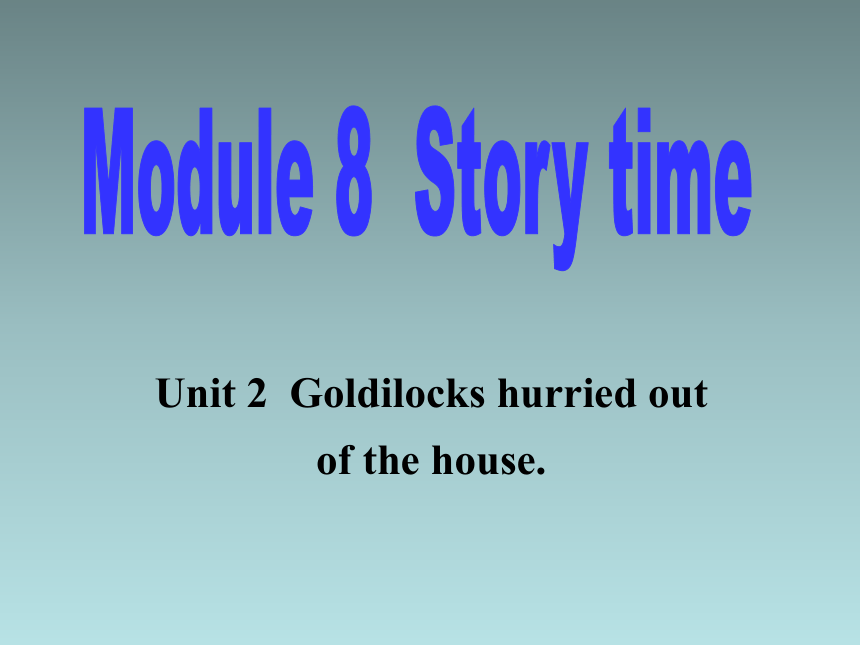 | |
| 格式 | ppt | ||
| 文件大小 | 2.0MB | ||
| 资源类型 | 教案 | ||
| 版本资源 | 外研版 | ||
| 科目 | 英语 | ||
| 更新时间 | 2022-07-09 10:41:17 | ||
图片预览

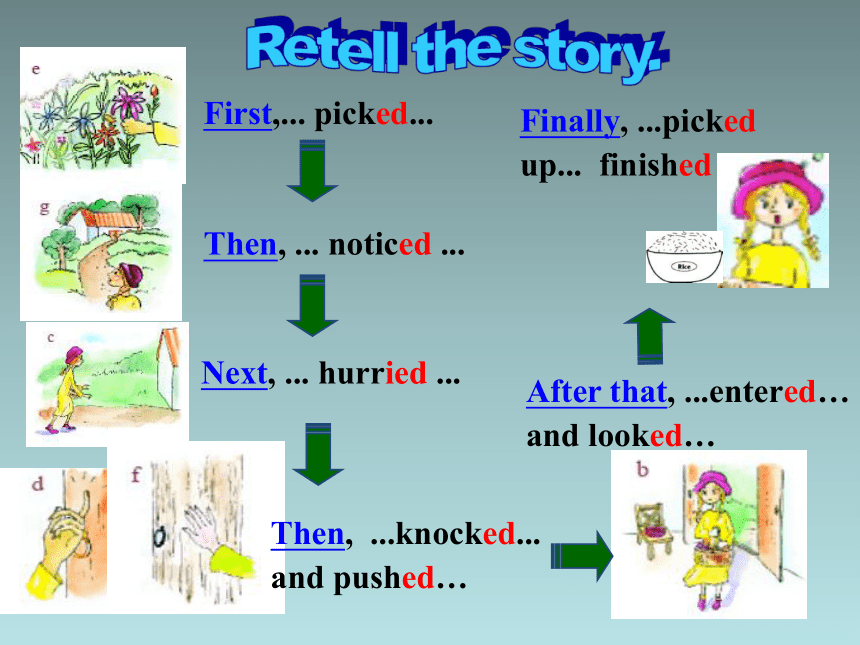
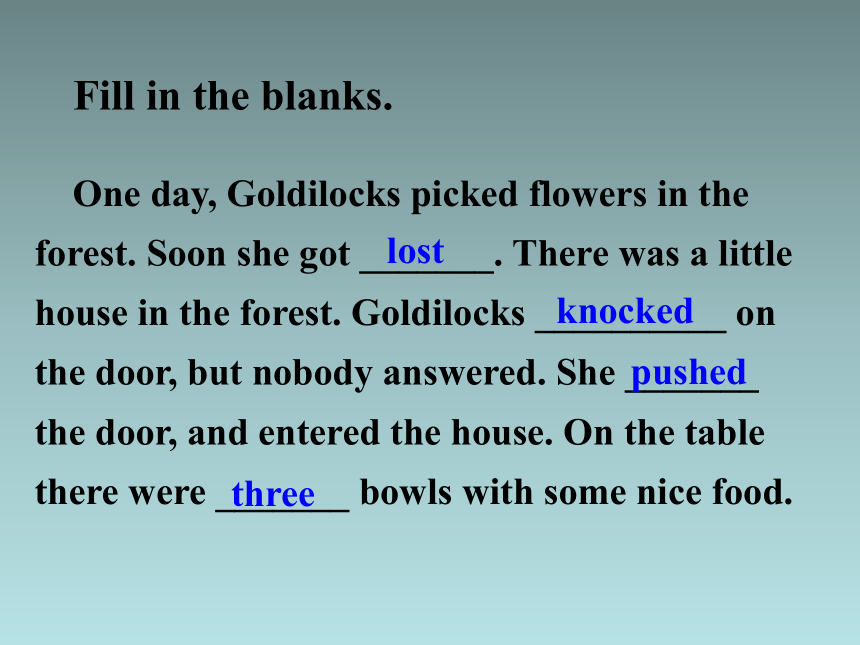
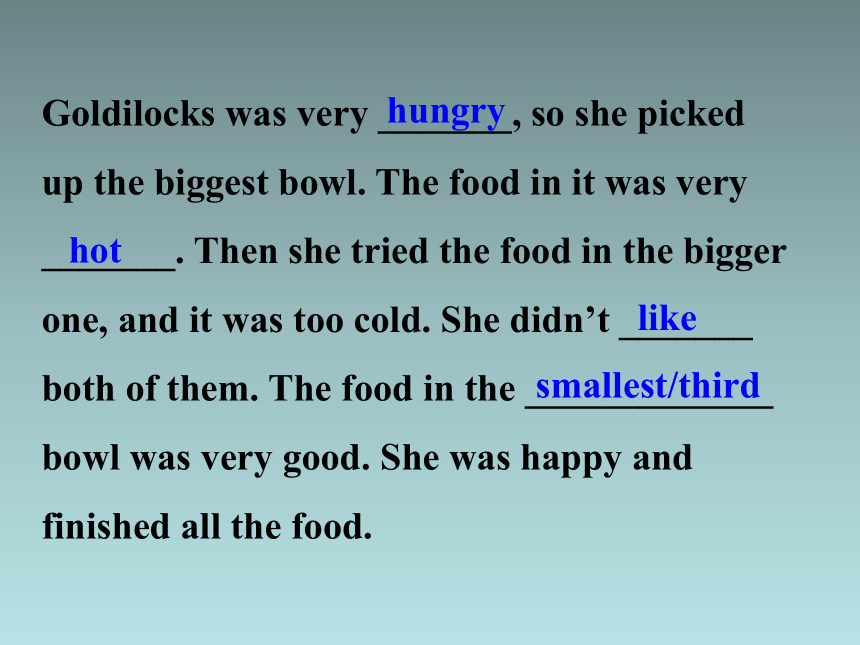
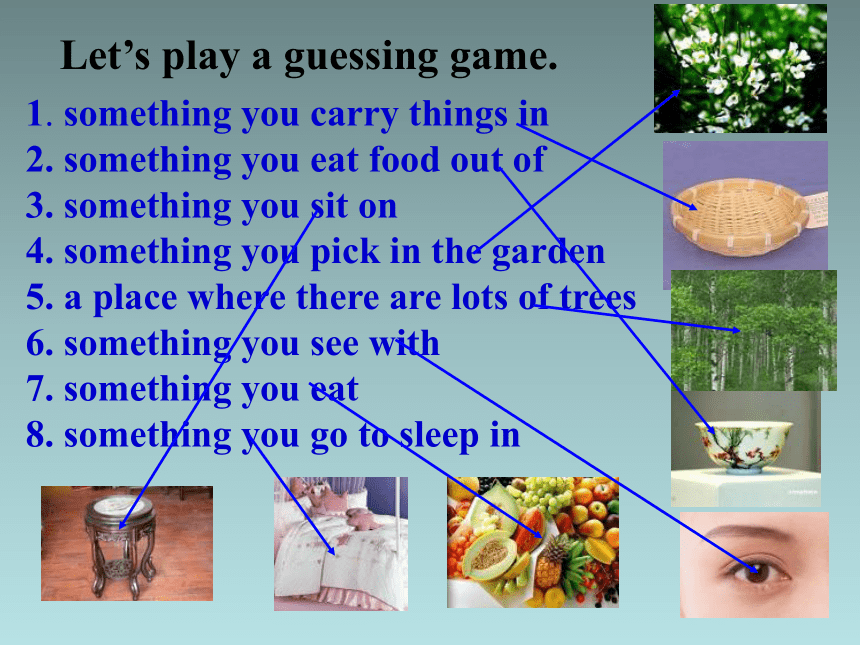
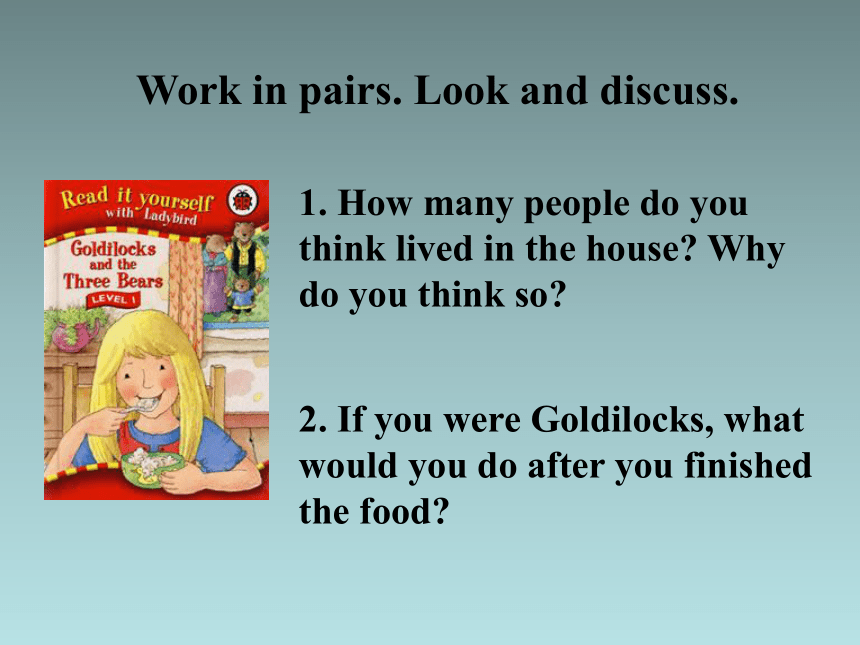
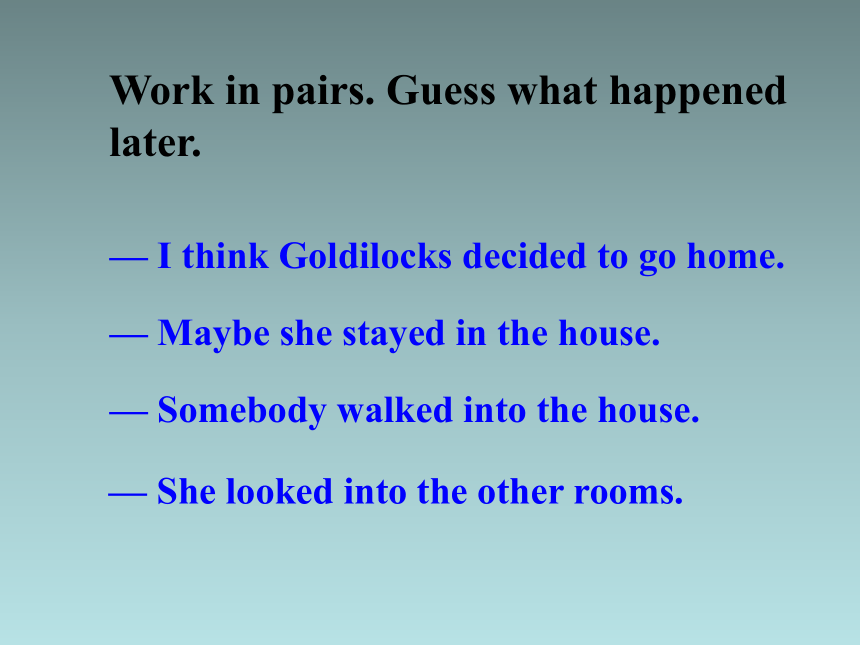
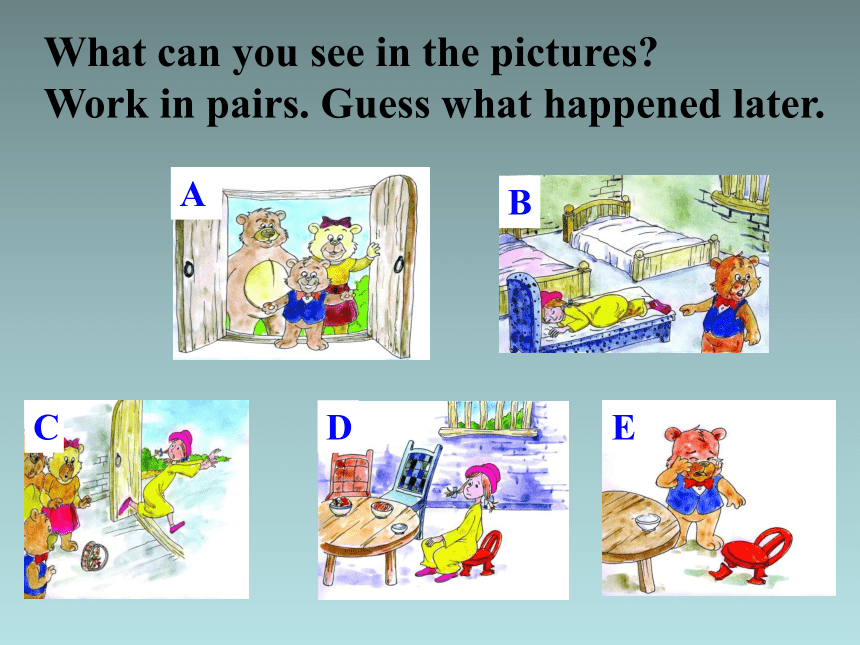
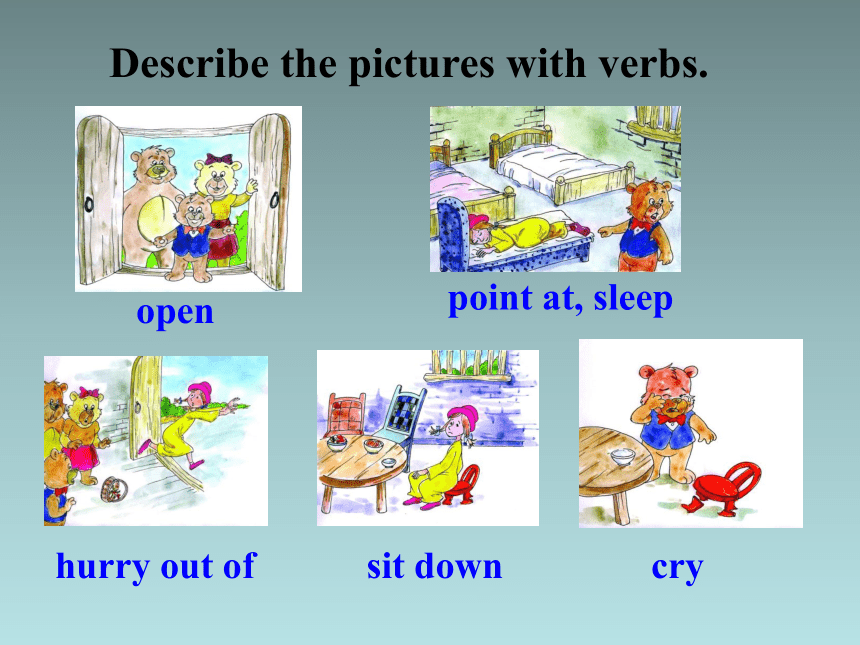
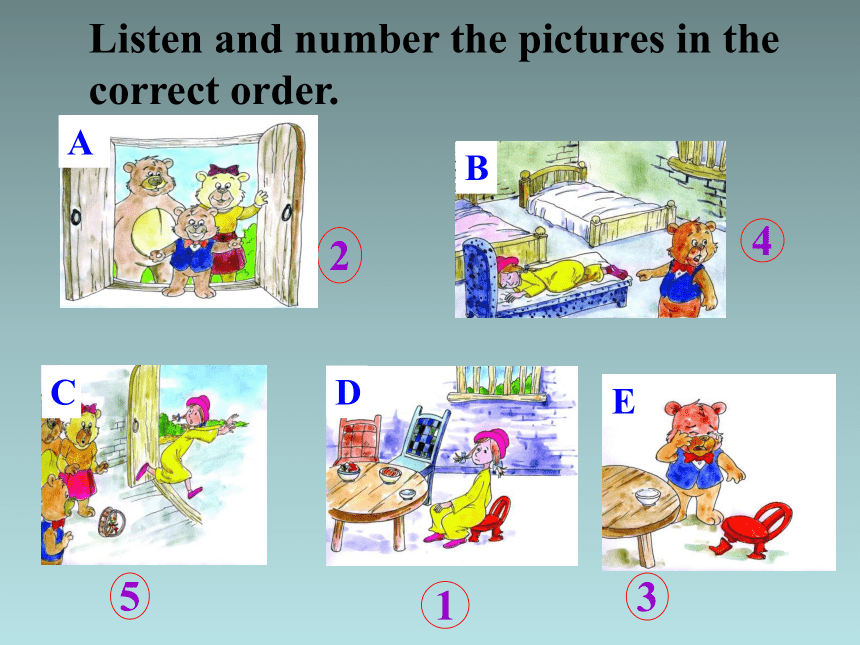
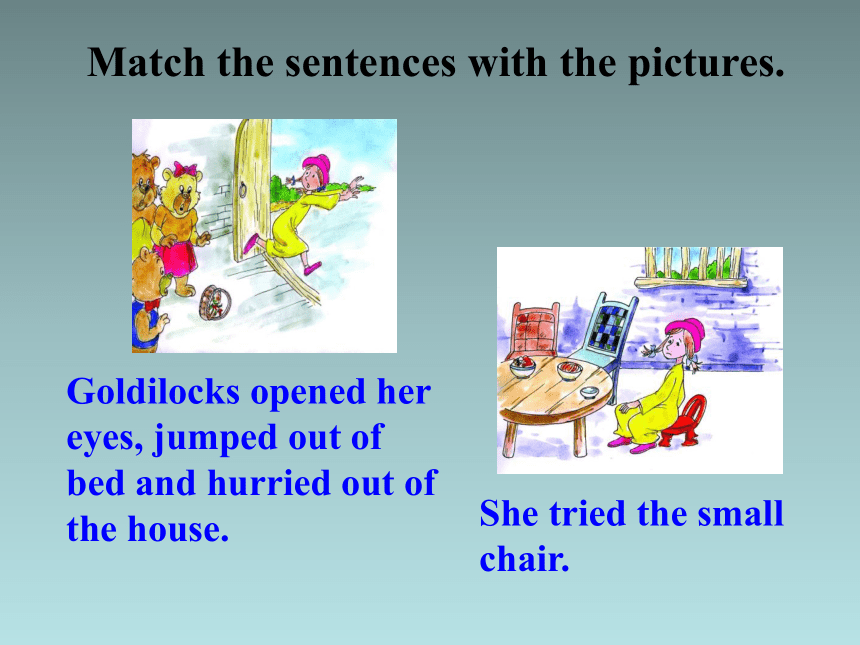
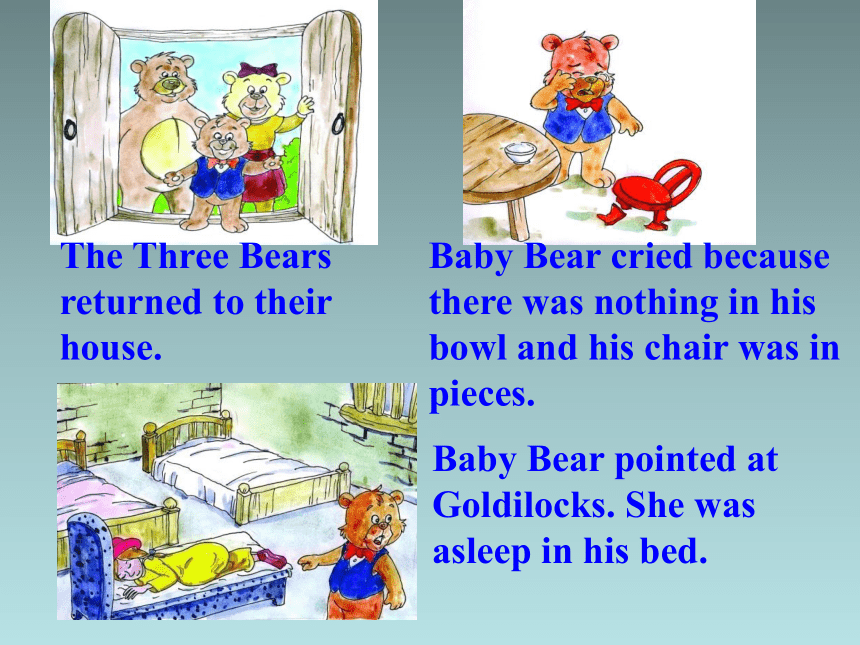
文档简介
(共50张PPT)
Unit 2 Goldilocks hurried out
of the house.
Finally, ...picked up... finished ..
First,... picked...
Then, ... noticed ...
Next, ... hurried ...
Then, ...knocked...
and pushed…
After that, ...entered…
and looked…
Fill in the blanks.
One day, Goldilocks picked flowers in the forest. Soon she got _______. There was a little house in the forest. Goldilocks __________ on the door, but nobody answered. She _______ the door, and entered the house. On the table there were _______ bowls with some nice food.
lost
knocked
pushed
three
Goldilocks was very _______, so she picked up the biggest bowl. The food in it was very _______. Then she tried the food in the bigger one, and it was too cold. She didn’t _______ both of them. The food in the _____________ bowl was very good. She was happy and finished all the food.
hungry
hot
like
smallest/third
1. something you carry things in
2. something you eat food out of
3. something you sit on
4. something you pick in the garden
5. a place where there are lots of trees
6. something you see with
7. something you eat
8. something you go to sleep in
Let’s play a guessing game.
1. How many people do you think lived in the house Why do you think so
2. If you were Goldilocks, what would you do after you finished the food
Work in pairs. Look and discuss.
— I think Goldilocks decided to go home.
— Maybe she stayed in the house.
— Somebody walked into the house.
— She looked into the other rooms.
Work in pairs. Guess what happened later.
What can you see in the pictures
Work in pairs. Guess what happened later.
A
B
C
D
E
Describe the pictures with verbs.
open
cry
hurry out of
point at, sleep
sit down
1
2
3
4
5
A
B
C
D
E
Listen and number the pictures in the correct order.
Goldilocks opened her eyes, jumped out of bed and hurried out of the house.
She tried the small chair.
Match the sentences with the pictures.
Baby Bear pointed at Goldilocks. She was asleep in his bed.
The Three Bears returned to their house.
Baby Bear cried because there was nothing in his bowl and his chair was in pieces.
1. Goldilocks like the big chair.
2. Goldilocks liked the small bed.
3. Baby Bear looked in the bedroom.
4. The Three Bears were happy to see Goldilocks.
5. Goldilocks didn’t like the Three Bears.
Read and check the true sentences.
×
√
×
√
√
Read Para. 1 and answer the question.
Why did Goldilocks want to sit down
Which chair did she like
But what happened
Because she was tired.
She liked the small chair.
She was very heavy and soon the chair was in pieces.
Read Para. 2 and check the true sentences.
Goldilocks was happy and tired.
She liked the small bed.
She was asleep in the chair very soon.
√
×
×
unhappy
bed
Read Para. 3 and answer the question.
Why did Baby Bear cry
Because there’s nothing in his bowl and his chair was in pieces.
Read Para. 4 and check the true sentences.
The Bears noticed Goldilocks at first.
Baby Bear cried again because the little girl was in his bed.
√
×
didn’t notice
Read Para. 5 and answer the question.
What did Goldilocks do when she noticed the three Bears
Did she return to the forest again
She jumped out of bed and hurried out of the house without her basket.
No, she didn’t.
Read again and answer the questions.
1.How many chairs were there
2.What did she think about the big chairs
3.What happened to the small chair
There were three chairs.
They were not comfortable.
She tried it but she was very heavy and soon the chair was in pieces.
4. Which bed did she like
5. Was she very tired How do you know
She liked the small bed.
Yes. Because soon she was asleep in the bed.
Try to retell the text.
First, Goldilocks … because she was tired. The two big chairs were… She didn’t like them, so she tried … chair. It was nice, but Goldilocks was …
She was unhappy and tired. She … bedroom. There were three beds. She didn’t like the … The small bed was …
The Three Bears returned. They looked at … chairs. Baby Bear cried. “There’s nothing in my bowl and my chair is in pieces!’’ …
Next, the Bears … their bedroom. They didn’t …
Then Baby Bear … the little girl in his bed, and cried, …
Finally, Goldilocks … eyes. The Three Bears … her, so Goldilocks … bed and … the house without her basket. She … to the forest again.
How to write a good story
What words does it often use
First / Next / Then / Finally
What six elements does a story have
Time / Place / Person /
Reason / Event / Result
She knocked on the door.
She entered the house.
She looked around her.
She noticed a little house.
3
4
1
2
First she looked around her. Next she noticed a little house. Then she knocked on the door. Finally she entered the house.
Number these sentences in the correct order.
Use words like first, next, then and finally.
2. She looked into a small room.
She picked up the small bowl.
She picked up the big bowl.
She picked up the very big bowl.
1
4
3
2
First she looked into a small room. Next she picked up the very big bowl. Then she picked up the big bowl. Finally she picked up the small bowl.
Number these sentences in the correct order.
(first, next, then and finally)
Look at the sentences. Then, write some new sentences using first, next / then and finally.
(1) First, she tried the big chair.
(2) Then she tried the middle chair.
(3) Finally, she tried the small chair.
1. pick up / very big bowl / didn’t like / too hot
First, she picked up the very big bowl but she didn’t like it — it was too hot.
2. pick up / big bowl / didn’t like / too cold
3. pick up / small bowl / like / good
Next / Then, she picked up the big bowl but she didn’t like it — it was too cold.
Finally, she picked up the small bowl and she liked it — it was good.
Goldilocks and the Three Bears
Once upon a time …first …next … then …finally…
Choose some of the details to write the story.
Imagine what will happen next to the Three Bears and Goldilocks.
1. It was not comfortable either.
either adv. 也(不)
It's not heavy, either.
这也不那么重。
If you do not go, I shall not go either.
你不去,我也不去。
also, too和 either 这些词均含“也”之意。
too语气较轻,多用于口语,在肯定句中使用,通常位于句末。
also比too正式一些,语气较重,只用于肯定句,一般紧靠动词。
either用于否定句,放在句末,之前加逗号。
— Excuse me, could you tell me the way to the train station
— Sorry, I’m new here, _______.
A. also B. too C. either
We can _______ borrow books from the library.
A. also B. too C. either
—Could you tell me the way to the station
—Sorry, I don’t know about the city,
_______.
A. either B. too C. also
B
A
A
2. First, she tried the big chair.
try v. 尝试
I’m not good at singing, but I’ll try.
我不擅长唱歌,但是我试着唱唱。
Try some of this.
尝点这个。
try还常用于以下结构中: try to do sth. “努力做某事”。如:
They tried to do it well.
他们努力把这件事做好。
try doing sth.“尝试做某事”。如:
Tom tried riding the horse.
汤姆尝试着骑马。
[拓展] try常用短语
try on 试穿
try one’s best 尽某人最大的努力
Lily tried on a pair of black shoes.
莉莉试穿了一双黑色的鞋。
You should try your best to pass the exam.
你应该尽最大努力通过考试。
另外, try还可用作名词,常用于短语have a try at ...中,表示“尝试……”。如:
Let’s have a try at the job.
让我们试试这份工作。
You can have a try at a Chinese restaurant next time.
下次你不妨试试到中国餐馆吃饭。
翻译:
1)我将尽最大努力完成工作。
_______________________
2)她尽力把它算出来
_______________________
3)请尝尝这种新茶。
_______________________
I’ll try my best to finish the work.
She tries to work it out.
Please try the new tea.
3. The Three Bears returned.
return v. 返回 (相当于come / go back)
My father will return soon.
我父亲很快就会回来。
They returned to the village at last.
他们最后回到了那个村庄。
注意: return不能和back连用。
[拓展]
return还可意为“归还”,相当于give back。如:
Jim returned the book to the library last week.
吉姆上周把书还给了图书馆。
翻译:
1)她昨天回去了。
She ________ yesterday.
2)我必须今天把书还给图书馆。
I must ______ ____ ______ _____ _____ ________ today.
3)三天后我们将返回学校。
We _____ ______ _____ school ____ 3 days.
4) When did he ______ Suzhou
A. returned B. returned to
C. return D. return to
returned
return the book to the
will return to
in
D
library
4. Very soon she was asleep in it.
asleep adj. 睡着的
When he returned home, he found her asleep.
他回到家,发现她已睡着了。
He waits until the children are asleep.
他一直等到孩子们睡着了。
When do you go to bed every night
你每天晚上什么时候上床睡觉?
When do you go to bed every night
你每天晚上什么时候上床睡觉?
asleep一般作表语,表示“睡着了”,强调状态。
go to bed是动词短语,表示“上床睡觉”,但不一定睡着了,只是强调“去睡觉”这个动作。
sleep 睡觉(动词)
sleepy 困的,想睡觉的
fall asleep 入睡 (动作)
go to bed 去睡觉(动作)
go to sleep 入睡(动作)
1) 他累了,想早点去睡觉。
He is tired, so he wants to ____ ____ ____ early.
2) 那个小孩睡了,请不要大声说话。
The baby ____ ______. Don’t speak loudly.
3) 我很累,所以很快就睡着了。
I was very tired, so I _____ ______ very soon.
4) 你昨天晚上睡得好吗?
Did you ______ _____ last night
5) 你每天睡几个小时?
_____ ______ hours do you ______ every day
6) 在去睡觉之前,我爸爸通常看电视。
Before _____ _____ _____, my father usually ________ _____.
go to bed
is asleep
fell asleep
sleep well
How many
sleep
going to bed
watches TV
5. Then Baby Bear pointed at the little girl in his bed…
point at sb./sth. “指着某人或某物”,侧重近距离;
He was talking while pointing at the map.
他一边用手指着地图一边讲话。
point to sb. /sth. 意为“指向某人或某物”,强调方向,侧重远距离。
翻译:
1) 指着别人说话是不礼貌的。
It is not polite ____ _____ ____ others when talking.
2) 不要用手指着别人。
Don’t ______ ____ others with your fingers.
3) 他指向那座山,然后给我们讲了一个故事。
He _______ _____ the mountain and told us a story.
to point at
point at
pointed to
1. The boy was angry. He h______ out of the room without saying anything.
2. Don’t speak, please! The baby is a_______.
3. Hearing that bad news, he felt u________.
4. She c________ when she saw her chair was in pieces.
5. I was watching TV when my mother r_______ home yesterday.
6. She walked in the forest and p______ some flowers.
urried
sleep
nhappy
ried
eturned
icked
7. 珍妮经常用钢笔指着书上的字。
Jenny often ______ ______ the words _______ her pen.
8. 她向房间四周看了看,没有注意到我。
She _______ _______ the room and didn’t ______ me.
notice
points at
with
looked around
Read the story again. Imagine what will happen next. Write at least three sentences.
Unit 2 Goldilocks hurried out
of the house.
Finally, ...picked up... finished ..
First,... picked...
Then, ... noticed ...
Next, ... hurried ...
Then, ...knocked...
and pushed…
After that, ...entered…
and looked…
Fill in the blanks.
One day, Goldilocks picked flowers in the forest. Soon she got _______. There was a little house in the forest. Goldilocks __________ on the door, but nobody answered. She _______ the door, and entered the house. On the table there were _______ bowls with some nice food.
lost
knocked
pushed
three
Goldilocks was very _______, so she picked up the biggest bowl. The food in it was very _______. Then she tried the food in the bigger one, and it was too cold. She didn’t _______ both of them. The food in the _____________ bowl was very good. She was happy and finished all the food.
hungry
hot
like
smallest/third
1. something you carry things in
2. something you eat food out of
3. something you sit on
4. something you pick in the garden
5. a place where there are lots of trees
6. something you see with
7. something you eat
8. something you go to sleep in
Let’s play a guessing game.
1. How many people do you think lived in the house Why do you think so
2. If you were Goldilocks, what would you do after you finished the food
Work in pairs. Look and discuss.
— I think Goldilocks decided to go home.
— Maybe she stayed in the house.
— Somebody walked into the house.
— She looked into the other rooms.
Work in pairs. Guess what happened later.
What can you see in the pictures
Work in pairs. Guess what happened later.
A
B
C
D
E
Describe the pictures with verbs.
open
cry
hurry out of
point at, sleep
sit down
1
2
3
4
5
A
B
C
D
E
Listen and number the pictures in the correct order.
Goldilocks opened her eyes, jumped out of bed and hurried out of the house.
She tried the small chair.
Match the sentences with the pictures.
Baby Bear pointed at Goldilocks. She was asleep in his bed.
The Three Bears returned to their house.
Baby Bear cried because there was nothing in his bowl and his chair was in pieces.
1. Goldilocks like the big chair.
2. Goldilocks liked the small bed.
3. Baby Bear looked in the bedroom.
4. The Three Bears were happy to see Goldilocks.
5. Goldilocks didn’t like the Three Bears.
Read and check the true sentences.
×
√
×
√
√
Read Para. 1 and answer the question.
Why did Goldilocks want to sit down
Which chair did she like
But what happened
Because she was tired.
She liked the small chair.
She was very heavy and soon the chair was in pieces.
Read Para. 2 and check the true sentences.
Goldilocks was happy and tired.
She liked the small bed.
She was asleep in the chair very soon.
√
×
×
unhappy
bed
Read Para. 3 and answer the question.
Why did Baby Bear cry
Because there’s nothing in his bowl and his chair was in pieces.
Read Para. 4 and check the true sentences.
The Bears noticed Goldilocks at first.
Baby Bear cried again because the little girl was in his bed.
√
×
didn’t notice
Read Para. 5 and answer the question.
What did Goldilocks do when she noticed the three Bears
Did she return to the forest again
She jumped out of bed and hurried out of the house without her basket.
No, she didn’t.
Read again and answer the questions.
1.How many chairs were there
2.What did she think about the big chairs
3.What happened to the small chair
There were three chairs.
They were not comfortable.
She tried it but she was very heavy and soon the chair was in pieces.
4. Which bed did she like
5. Was she very tired How do you know
She liked the small bed.
Yes. Because soon she was asleep in the bed.
Try to retell the text.
First, Goldilocks … because she was tired. The two big chairs were… She didn’t like them, so she tried … chair. It was nice, but Goldilocks was …
She was unhappy and tired. She … bedroom. There were three beds. She didn’t like the … The small bed was …
The Three Bears returned. They looked at … chairs. Baby Bear cried. “There’s nothing in my bowl and my chair is in pieces!’’ …
Next, the Bears … their bedroom. They didn’t …
Then Baby Bear … the little girl in his bed, and cried, …
Finally, Goldilocks … eyes. The Three Bears … her, so Goldilocks … bed and … the house without her basket. She … to the forest again.
How to write a good story
What words does it often use
First / Next / Then / Finally
What six elements does a story have
Time / Place / Person /
Reason / Event / Result
She knocked on the door.
She entered the house.
She looked around her.
She noticed a little house.
3
4
1
2
First she looked around her. Next she noticed a little house. Then she knocked on the door. Finally she entered the house.
Number these sentences in the correct order.
Use words like first, next, then and finally.
2. She looked into a small room.
She picked up the small bowl.
She picked up the big bowl.
She picked up the very big bowl.
1
4
3
2
First she looked into a small room. Next she picked up the very big bowl. Then she picked up the big bowl. Finally she picked up the small bowl.
Number these sentences in the correct order.
(first, next, then and finally)
Look at the sentences. Then, write some new sentences using first, next / then and finally.
(1) First, she tried the big chair.
(2) Then she tried the middle chair.
(3) Finally, she tried the small chair.
1. pick up / very big bowl / didn’t like / too hot
First, she picked up the very big bowl but she didn’t like it — it was too hot.
2. pick up / big bowl / didn’t like / too cold
3. pick up / small bowl / like / good
Next / Then, she picked up the big bowl but she didn’t like it — it was too cold.
Finally, she picked up the small bowl and she liked it — it was good.
Goldilocks and the Three Bears
Once upon a time …first …next … then …finally…
Choose some of the details to write the story.
Imagine what will happen next to the Three Bears and Goldilocks.
1. It was not comfortable either.
either adv. 也(不)
It's not heavy, either.
这也不那么重。
If you do not go, I shall not go either.
你不去,我也不去。
also, too和 either 这些词均含“也”之意。
too语气较轻,多用于口语,在肯定句中使用,通常位于句末。
also比too正式一些,语气较重,只用于肯定句,一般紧靠动词。
either用于否定句,放在句末,之前加逗号。
— Excuse me, could you tell me the way to the train station
— Sorry, I’m new here, _______.
A. also B. too C. either
We can _______ borrow books from the library.
A. also B. too C. either
—Could you tell me the way to the station
—Sorry, I don’t know about the city,
_______.
A. either B. too C. also
B
A
A
2. First, she tried the big chair.
try v. 尝试
I’m not good at singing, but I’ll try.
我不擅长唱歌,但是我试着唱唱。
Try some of this.
尝点这个。
try还常用于以下结构中: try to do sth. “努力做某事”。如:
They tried to do it well.
他们努力把这件事做好。
try doing sth.“尝试做某事”。如:
Tom tried riding the horse.
汤姆尝试着骑马。
[拓展] try常用短语
try on 试穿
try one’s best 尽某人最大的努力
Lily tried on a pair of black shoes.
莉莉试穿了一双黑色的鞋。
You should try your best to pass the exam.
你应该尽最大努力通过考试。
另外, try还可用作名词,常用于短语have a try at ...中,表示“尝试……”。如:
Let’s have a try at the job.
让我们试试这份工作。
You can have a try at a Chinese restaurant next time.
下次你不妨试试到中国餐馆吃饭。
翻译:
1)我将尽最大努力完成工作。
_______________________
2)她尽力把它算出来
_______________________
3)请尝尝这种新茶。
_______________________
I’ll try my best to finish the work.
She tries to work it out.
Please try the new tea.
3. The Three Bears returned.
return v. 返回 (相当于come / go back)
My father will return soon.
我父亲很快就会回来。
They returned to the village at last.
他们最后回到了那个村庄。
注意: return不能和back连用。
[拓展]
return还可意为“归还”,相当于give back。如:
Jim returned the book to the library last week.
吉姆上周把书还给了图书馆。
翻译:
1)她昨天回去了。
She ________ yesterday.
2)我必须今天把书还给图书馆。
I must ______ ____ ______ _____ _____ ________ today.
3)三天后我们将返回学校。
We _____ ______ _____ school ____ 3 days.
4) When did he ______ Suzhou
A. returned B. returned to
C. return D. return to
returned
return the book to the
will return to
in
D
library
4. Very soon she was asleep in it.
asleep adj. 睡着的
When he returned home, he found her asleep.
他回到家,发现她已睡着了。
He waits until the children are asleep.
他一直等到孩子们睡着了。
When do you go to bed every night
你每天晚上什么时候上床睡觉?
When do you go to bed every night
你每天晚上什么时候上床睡觉?
asleep一般作表语,表示“睡着了”,强调状态。
go to bed是动词短语,表示“上床睡觉”,但不一定睡着了,只是强调“去睡觉”这个动作。
sleep 睡觉(动词)
sleepy 困的,想睡觉的
fall asleep 入睡 (动作)
go to bed 去睡觉(动作)
go to sleep 入睡(动作)
1) 他累了,想早点去睡觉。
He is tired, so he wants to ____ ____ ____ early.
2) 那个小孩睡了,请不要大声说话。
The baby ____ ______. Don’t speak loudly.
3) 我很累,所以很快就睡着了。
I was very tired, so I _____ ______ very soon.
4) 你昨天晚上睡得好吗?
Did you ______ _____ last night
5) 你每天睡几个小时?
_____ ______ hours do you ______ every day
6) 在去睡觉之前,我爸爸通常看电视。
Before _____ _____ _____, my father usually ________ _____.
go to bed
is asleep
fell asleep
sleep well
How many
sleep
going to bed
watches TV
5. Then Baby Bear pointed at the little girl in his bed…
point at sb./sth. “指着某人或某物”,侧重近距离;
He was talking while pointing at the map.
他一边用手指着地图一边讲话。
point to sb. /sth. 意为“指向某人或某物”,强调方向,侧重远距离。
翻译:
1) 指着别人说话是不礼貌的。
It is not polite ____ _____ ____ others when talking.
2) 不要用手指着别人。
Don’t ______ ____ others with your fingers.
3) 他指向那座山,然后给我们讲了一个故事。
He _______ _____ the mountain and told us a story.
to point at
point at
pointed to
1. The boy was angry. He h______ out of the room without saying anything.
2. Don’t speak, please! The baby is a_______.
3. Hearing that bad news, he felt u________.
4. She c________ when she saw her chair was in pieces.
5. I was watching TV when my mother r_______ home yesterday.
6. She walked in the forest and p______ some flowers.
urried
sleep
nhappy
ried
eturned
icked
7. 珍妮经常用钢笔指着书上的字。
Jenny often ______ ______ the words _______ her pen.
8. 她向房间四周看了看,没有注意到我。
She _______ _______ the room and didn’t ______ me.
notice
points at
with
looked around
Read the story again. Imagine what will happen next. Write at least three sentences.
同课章节目录
- Module 1 Lost and found
- Unit 1 Whose bag is this?
- Unit 2 Are they yours?
- Unit 3 Language in use
- Module 2 What can you do ?
- Unit 1 I can play the piano
- Unit 2 I can run really fast
- Unit 3 Language in use
- Module 3 Making plans
- Unit 1 What are you going to do at the weekends?
- Unit 2 We're going to cheer the players.
- Unit 3 Language in use
- Module 4 Life in the future
- Unit 1 Everyone will study at home
- Unit 2 Every family will have a small plane.
- Unit 3 Language in use
- Module 5 Shopping
- Unit 1 What can I do for you?
- Unit 2 You can buy everything on the Internet
- Unit 3 Language in use
- Module 6 Around town
- Unit 1 Could you tell me how to get to the Nationa
- Unit 2 The London Eye is on your right.
- Unit 3 Language in use
- Revision module A
- Module 7 My past life
- Unit 1 I was born in a small village.
- Unit 2 I was born in Quincy.
- Unit 3 Language in use
- Module 8 Story time
- Unit 1 Once upon a time….
- Unit 2 Goldilocks hurried out of the house.
- Unit 3 Language in use
- Module 9 Life history
- Unit 1 He left school and began work at the age of
- Unit 2 He decided to be an actor.
- Unit 3 Language in use
- Module 10 A holiday journey
- Unit 1 What did you do?
- Unit 2 This morning we took a walk.
- Unit 3 Language in use
- Module 11 Body language
- Unit 1 They touch noses!
- Unit 2 Here are some ways to welcome them.
- Unit 3 Language in use
- Module 12 Western music
- Unit 1 It's so beautiful!
- Unit 2 Vienna is the centre of European classical
- Unit 3 Language in use
- Revision module B
